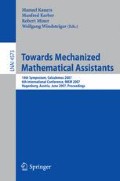Abstract
This paper looks at the feasibility of applying the quantifier elimination program QEPCAD-B to obtain quantifier-free conditions for the approximate factorization of a simple hyperbolic linear partial differential operator (LPDO) of order 2 over some given bounded rectangular domain in the plane. A condition for approximate factorization of such an operator to within some given tolerance over some given bounded rectangular domain is first stated as a quantified formula of elementary real algebra. Then QEPCAD-B is applied to try to eliminate the quantifiers from the formula. While QEPCAD-B required too much space and time to finish its task, it was able to find a partial solution to the problem. That is, it was able to find a nontrivial quantifier-free sufficient condition for the original quantified formula.
Access this chapter
Tax calculation will be finalised at checkout
Purchases are for personal use only
Preview
Unable to display preview. Download preview PDF.
References
Beals, R., Kartashova, E.: Constructively factoring linear partial differential operators in two variables. TMPh 145(2), 1510–1523 (2005)
Kartashova, E., Rudenko, O.: Invariant Form of BK-factorization and its Applications. In: Calmet, J., Seiler, W.M., Tucker, R.W. (eds.) Proc. GIFT-2006, Universitätsverlag Karlsruhe, pp. 225–241 (2006)
Collins, G.E.: Quantifier elimination for real closed fields by cylindrical algebraic decomposition. In: Brakhage, H. (ed.) Automata Theory and Formal Languages. LNCS, vol. 33, pp. 134–183. Springer, Heidelberg (1975)
Personal communication with Bruno Buchberger (2005)
Arnon, D., Collins, G., McCallum, S.: Cylindrical algebraic decomposition I: the basic algorithm. JSC 13(4), 878–889 (1984)
Brown, C.: QEPCAD B: a program for computing with semi-algebraic sets using CADs. ACM SIGSAM Bulletin 37(4), 97–108 (2003)
Caviness, B.F., Johnson, J.R. (eds.): Quantifier Elimination and Cylindrical Algebraic Decomposition. Springer, Berlin (1998)
Collins, G.E., Hong, H.: Partial cylindrical algebraic decomposition for quantifier elimination. JSC 12(3), 299–328 (1991)
Author information
Authors and Affiliations
Editor information
Rights and permissions
Copyright information
© 2007 Springer-Verlag Berlin Heidelberg
About this paper
Cite this paper
Kartashova, E., McCallum, S. (2007). Quantifier Elimination for Approximate Factorization of Linear Partial Differential Operators. In: Kauers, M., Kerber, M., Miner, R., Windsteiger, W. (eds) Towards Mechanized Mathematical Assistants. MKM Calculemus 2007 2007. Lecture Notes in Computer Science(), vol 4573. Springer, Berlin, Heidelberg. https://doi.org/10.1007/978-3-540-73086-6_9
Download citation
DOI: https://doi.org/10.1007/978-3-540-73086-6_9
Publisher Name: Springer, Berlin, Heidelberg
Print ISBN: 978-3-540-73083-5
Online ISBN: 978-3-540-73086-6
eBook Packages: Computer ScienceComputer Science (R0)

